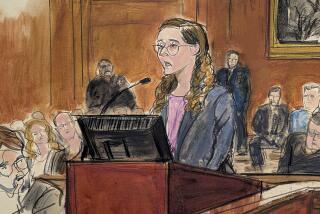Pinstripes to Prison Stripes
- Share via
In a matter of months, a bad crop of U.S. corporate executives incinerated trillions of dollars in wealth and destroyed the lives of thousands of innocent employees. Only now has the first of the accused white-collar big players started to pay for the unprecedented fiscal chicanery of 2001 and 2002 that has stirred deep, disturbing questions about big business and justice.
Prosecutors deserve praise for Wednesday’s flip of Andrew Fastow, an architect of the December 2001 Enron catastrophe that destroyed $68 billion in investor wealth. He struck a deal to plead guilty to two counts of conspiracy to defraud investors and received a stiff 10-year sentence.
Fastow also will tell investigators what former Enron Chairman Kenneth Lay and former Chief Executive Jeffrey Skilling knew and did.
This promises to be a breakthrough in CEO prosecutions that had been more show -- perp walks staged for cameras -- than the crucial business of assigning blame and punishment to those who bankrupted companies like WorldCom (the largest U.S. corporate bankruptcy), Enron (No. 2) and Adelphia Communications (No. 8).
In months to come, a pinstriped rogue’s gallery of former executives will walk into courts across the country for criminal trials. Adelphia founder John Rigas is charged with treating the company as a personal piggy bank. Former HealthSouth Chief Executive Richard Scrushy faces 650 years in prison and $36 million in fines if convicted of 85 criminal counts. Former Tyco International CEO L. Dennis Kozlowski faces 30 years in prison if convicted of 37 counts. And WorldCom’s former chief financial officer, Scott D. Sullivan, faces conspiracy, securities fraud and bank fraud charges for his role in WorldCom’s bankruptcy.
Justice demands that even these barons -- who now diminish their corporate roles and suffer striking, sudden memory-impairment -- enjoy a presumption of innocence and fair trial.
But those convicted of defrauding investors and wrecking employees’ lives deserve the law’s harshest due. Their exalted power and position may have let them believe they were above fairness and justice. And, indeed, as long as CEO and CFO pay grows in lock step with the corporate bottom line, there will be huge pressure to “somehow make the numbers.”
But real business and the U.S. economy is more than numbers, and the message must be sent, hard and fast, about those who would make shareholders pay for their Lamborghinis, $6,000 shower curtains and Picassos: That loud clang won’t be a bonus falling in a fat account but a prison door slamming. It’s a rude noise that, to counteract unfettered greed, must echo in boardrooms, banks, accounting firms and the offices of mutual funds and Wall Street analysts.
More to Read
Inside the business of entertainment
The Wide Shot brings you news, analysis and insights on everything from streaming wars to production — and what it all means for the future.
You may occasionally receive promotional content from the Los Angeles Times.










